Related Research Articles

The Palace of Westminster is the meeting place of the Parliament of the United Kingdom and is located in London, England. It is commonly called the Houses of Parliament after the House of Commons and the House of Lords, the two legislative chambers which occupy the building. The palace is one of the centres of political life in the United Kingdom; "Westminster" has become a metonym for the UK Parliament and the British Government, and the Westminster system of government commemorates the name of the palace. The Elizabeth Tower of the palace, nicknamed Big Ben, is a landmark of London and the United Kingdom in general. The palace has been a Grade I listed building since 1970 and part of a UNESCO World Heritage Site since 1987.
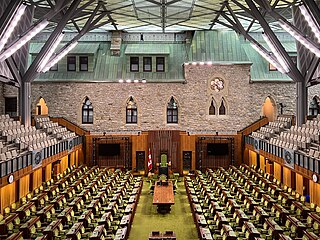
The House of Commons of Canada is the lower house of the Parliament of Canada. Together with the Crown and the Senate of Canada, they comprise the bicameral legislature of Canada.
The West Lothian question, also known as the English question, is a political issue in the United Kingdom. It concerns the question of whether members of Parliament (MPs) from Northern Ireland, Scotland and Wales who sit in the House of Commons should be able to vote on matters that affect only England, while neither they nor MPs from England are able to vote on matters that have been devolved to the Northern Ireland Assembly, the Scottish Parliament and the Senedd. The term West Lothian question was coined by Enoch Powell MP in 1977 after Tam Dalyell, the Labour MP for the Scottish constituency of West Lothian, raised the matter repeatedly in House of Commons debates on devolution.

The Palace of Westminster, the medieval royal palace used as the home of the British parliament, was largely destroyed by fire on 16 October 1834. The blaze was caused by the burning of small wooden tally sticks which had been used as part of the accounting procedures of the Exchequer until 1826. The sticks were disposed of carelessly in the two furnaces under the House of Lords, which caused a chimney fire in the two flues that ran under the floor of the Lords' chamber and up through the walls.

Portcullis House (PCH) is an office building in Westminster, London, England, that was commissioned in 1992 and opened in 2001 to provide offices for 213 members of the Parliament of the United Kingdom and their staff. The public entrance is on the Embankment. Part of the Parliamentary Estate, the building augments limited space in the Palace of Westminster and surroundings.

Angus Struan Carolus Robertson is a Scottish politician serving as the Cabinet Secretary for the Constitution, External Affairs and Culture since 2021. Formerly Depute Leader of the Scottish National Party (SNP) from 2016 to 2018, he has served as the Member of the Scottish Parliament (MSP) for Edinburgh Central since 2021. Robertson previously served as a Westminster MP for Moray from 2001 to 2017, where he served from 2007 to 2017 as the Leader of the SNP in the House of Commons.
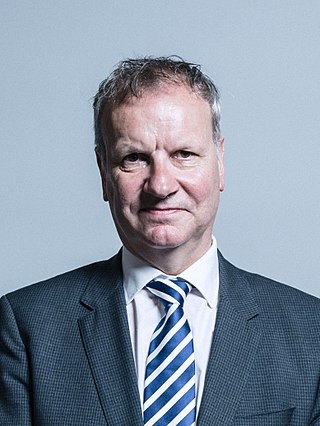
Peter Wishart is a Scottish National Party (SNP) politician and musician who has served as the Member of Parliament (MP) for Perth and Kinross-shire since 2024. He previously served as the MP for Perth and North Perthshire from 2005 to 2024 and North Tayside from 2001 to 2005.
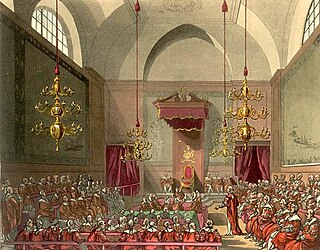
The reform of the House of Lords, the upper house of the Parliament of the United Kingdom, has been a topic of discussion in UK politics for more than a century. Multiple governments have attempted reform, beginning with the introduction of the Parliament Act 1911 by the incumbent Liberal Government. When the Labour Party came to power in the 1997 general election, the Blair government passed the House of Lords Act 1999. On 7 November 2001 the government undertook a public consultation. This helped to create a public debate on the issue of Lords reform, with 1,101 consultation responses and numerous debates in Parliament and the media. However, no consensus on the future of the upper chamber emerged.

The Parliamentary Archives of the United Kingdom preserves and makes available to the public the records of the House of Lords and House of Commons back to 1497, as well as some 200 other collections of parliamentary interest. The present title was officially adopted in November 2006, as a change from the previous title, the House of Lords Record Office.

Alexander Elliot Anderson Salmond was a Scottish politician who served as First Minister of Scotland from 2007 to 2014. A prominent figure in the Scottish nationalist movement, he was Leader of the Scottish National Party (SNP) on two occasions, from 1990 to 2000 and from 2004 to 2014. He then served as leader of the Alba Party from 2021 until his death in 2024.
The House of Commons Commission is the overall supervisory body of the House of Commons administration in the United Kingdom. The commission is a corporate body established by the House of Commons (Administration) Act 1978. The commission continues to exist during the dissolution period and the person who was Speaker continues in office as a member of the commission until a speaker is chosen by the new parliament.

Sir Gerald Bernard Kaufman was a British politician and author who served as a minister throughout the Labour government of 1974 to 1979. Elected as a member of parliament (MP) at the 1970 general election, he became Father of the House in 2015 and served until his death in 2017.
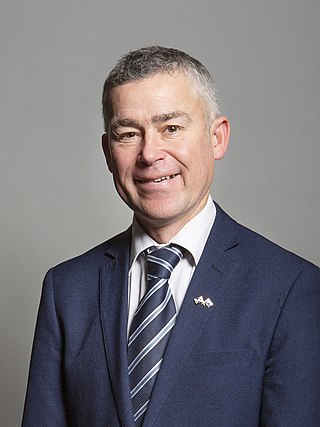
Alan Brown is a Scottish National Party (SNP) politician who served as the Member of Parliament (MP) for Kilmarnock and Loudoun from 2015 until 2024. Brown previously served as the SNP spokesperson on Energy Security and Net Zero (2022–2023), Energy and Climate Change (2020–2022), Transport (2017–2020) and Infrastructure and Energy (2017–2018) in the House of Commons.

Neil Charles Gray is a Scottish politician serving as Cabinet Secretary for Health and Social Care since 2024. A member of the Scottish National Party (SNP), he has been the Member of the Scottish Parliament (MSP) for Airdrie & Shotts since 2021. Gray previously served as the Member of Parliament (MP) for the equivalent Westminster seat from 2015 to 2021. He served as Cabinet Secretary for Wellbeing Economy, Fair Work and Energy from 2023 to 2024, and Minister for Culture, Europe and International Development from 2022 to 2023.
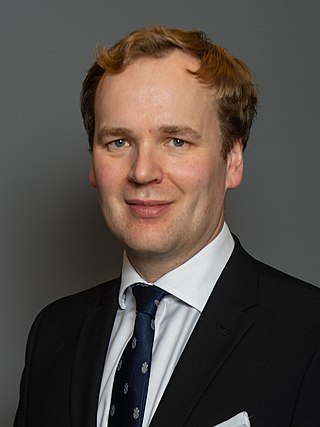
William Peter Wragg, is a British politician who served as the Member of Parliament (MP) for Hazel Grove in Greater Manchester from 2015 to 2024. As a member of the Conservative Party, he previously served as a vice-chairman of its 1922 Committee. From April 2024 until parliament was dissolved in May 2024, he sat as an independent.
The Joint Committee on the Palace of Westminster was a Joint Select Committee appointed to assess the options contained within an independent assessment report on a proposed major restoration and renewal of the Palace of Westminster and "make recommendations on a preferred way forward".
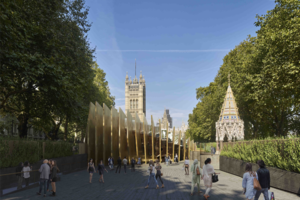
A UK Holocaust Memorial and learning centre was first proposed in 2015 to preserve the testimony of British Holocaust survivors and concentration camp liberators and to honour Jewish and other victims of attempted extermination by Nazi Germany, including Gypsies and disabled people.
The history of the Palace of Westminster began in the Middle Ages – in the early eighth century – when there was an Anglo-Saxon church dedicated to St. Peter the Apostle which became known as the West Minster. In the tenth century the church became a Benedictine abbey and was adopted as a royal church, which subsequently became a royal palace in the 11th century.

The Virtual House of Commons is a name given to a series of measures involving the United Kingdom's House of Commons, including the use of video-conferencing and the practising of social distancing. The measures were announced in April 2020 to help stop the spread of coronavirus during the ongoing pandemic.
References
- ↑ "York was destined to be capital". 31 May 2019.
- ↑ "Why York should be the capital of England". The Guardian . 12 January 2000.
- ↑ Williams, Jennifer (17 September 2014). "Council bosses to study plan to move Parliament to Manchester". Manchester Evening News . Archived from the original on 24 December 2017. Retrieved 24 August 2018.
- ↑ Simm, Pippa (3 March 2015). "Where could MPs go if Parliament is closed for repairs?". BBC News. Archived from the original on 8 February 2018. Retrieved 24 August 2018.
- ↑ Dathan, Matt (18 March 2015). "Guess where George Galloway wants to move the Houses of Parliament? On his doorstep in Leeds" . The Independent . Archived from the original on 25 May 2022. Retrieved 24 August 2018.
- ↑ Sewage, Cholera and moving Parliament to Oxford, from the Museum of Oxford
- ↑ "Bulletin 29 October 2012". UK Parliament. Retrieved 24 June 2017.
- ↑ Dransfield, Louise (10 December 2015). "Shortlist revealed for £6bn Houses of Parliament revamp | Online News". Building . Retrieved 24 June 2017.
- ↑ Dransfield, Louise (13 July 2016). "Temporary parliament may be added to £500m Northern Estate job | Magazine News". Building. Retrieved 24 June 2017.
- ↑ "Major programme of works to Palace of Westminster is essential – News from Parliament". UK Parliament. Retrieved 24 June 2017.
- ↑ Keegan, Simon (9 September 2016). "Houses of Parliament should be sold off, Labour MP says". BBC News. Retrieved 9 September 2016.
- ↑ "Select Committee On Science And Technology" (PDF). Parliament.uk. Retrieved 24 June 2017.
- ↑ Leftly, Mark (13 October 2016). "Salmond calls for parliament to move north | Magazine News". Building. Retrieved 24 June 2017.
- ↑ Leftly, Mark (14 October 2016). "Corbyn welcomes plan for temporary 'floating parliament' | Magazine News". Building. Retrieved 24 June 2017.
- ↑ "Lib Dem Tony Greaves wants new UK capital city built". Bbc.co.uk. 2 December 2016.
- ↑ Dransfield, Louise (13 December 2016). "Consultant team scoops £500m MPs' offices revamp | Online News". Building. Retrieved 24 June 2017.
- ↑ "MPs to scrutinise cost of parliament restoration works". BBC News. 15 January 2017.
- ↑ "Restoration and Renewal of the Palace of Westminster inquiry launched – News from Parliament". UK Parliament. Retrieved 24 June 2017.
- ↑ Clark, Tim (16 January 2017). "Michael Gove backs opposition to £3.5bn Parliament move | Online News". Building. Retrieved 24 June 2017.
- ↑ "Public Accounts Committee". parliamentlive.tv. 21 February 2017.
- ↑ "HMS Parliament proposal website". Beckett Rankine. Retrieved 11 December 2017.
- ↑ "MPs vote to leave Parliament during refit". BBC News . 1 February 2018. Retrieved 24 August 2018.
- ↑ "Restoration and Renewal". www.restorationandrenewal.uk.
- ↑ "Re-uniting the UK: 10 reasons for moving the UK's Parliament north | Niall Cooper". Niallcooper.wordpress.com. 17 September 2014. Retrieved 24 June 2017.
- ↑ Leftly, Mark (13 October 2016). "Salmond calls for parliament to move north". Building.